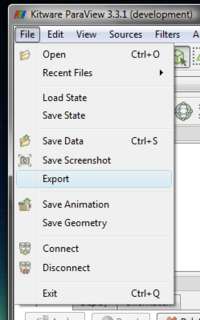Exporting Scenes: Difference between revisions
From KitwarePublic
Jump to navigationJump to search
mNo edit summary |
No edit summary |
||
| Line 1: | Line 1: | ||
ParaView provides functionality to export any scene set up with polygonal data (i.e without volume rendering). Currently | ParaView provides functionality to export any scene set up with polygonal data (i.e without volume rendering). Currently [http://www.web3d.org/x3d/ X3D] (ASCII as well as binary) and [http://www.web3d.org/x3d/vrml VRML (Virtual Reality Modeling Language)] are supported. To export a scene, set up the scene in a 3D view. Only one view can be exported at a time. With the view to be exported active, choose '''File | Export'''. | ||
[[Image:Export.png|200px|thumb|right|'''Export''' option in the '''File''' menu can be used to export the scene set up in a 3D view]] | [[Image:Export.png|200px|thumb|right|'''Export''' option in the '''File''' menu can be used to export the scene set up in a 3D view]] | ||
Revision as of 17:59, 16 September 2008
ParaView provides functionality to export any scene set up with polygonal data (i.e without volume rendering). Currently X3D (ASCII as well as binary) and VRML (Virtual Reality Modeling Language) are supported. To export a scene, set up the scene in a 3D view. Only one view can be exported at a time. With the view to be exported active, choose File | Export.
The file-open dialog will list the available types. The type is determined based on the extensions of the file written out:
- *.vrml -- VRML
- *.x3d -- X3D ASCII
- *.x3db -- X3D Binary
